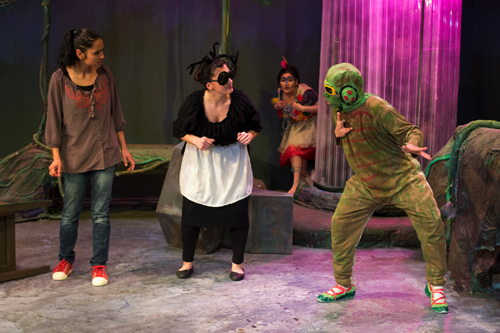
The curtain opens on a frustrated father, exhausted mother, prima-donna daughter and gangster son. Their faces obscured by classical masks, the ensemble looks, at first glance, like a caricature of a Mexican-American family.
During the course of a dream sequence that’s equal parts Pan’s Labyrinth and One Hundred Years of Solitude, it’s revealed that these exaggerated characters are not at all what they appear to be.
Jardín de Sueños, (English: Garden of Dreams) an original Spanish-language play currently showing at Southeast Portland’s Miracle Theatre, confronts the difficulties of the immigrant experience while offering tangible solutions to a challenge that affects young people of all backgrounds: figuring out how to pay for college.

Director Nelda Reyes, a Portland State graduate, crafted the production to raise awareness of this issue, which is even more complicated for many immigrant families—a reality that in Portland is often overlooked in conversations about rising tuition prices.
Every year, some 65,000 undocumented students graduate high school in the United States, according to the Immigration Policy Center. These students are ineligible for many forms of financial aid, creating what can seem like an insurmountable barrier for many young people seeking higher education.
“It’s kind of a taboo thing to talk about. It’s embarrassing to be undocumented,” Reyes said.
Many families feel shame about discussing their financial circumstances. Although Jardín de Sueños explicitly mentions the DREAM Act—proposed legislation that would expand access to college for undocumented students—Reyes is quick to point out that the play’s goal isn’t to champion a particular legislative fix.
“For me, it’s not about the DREAM Act; it’s about listening to stories from people I know,” she said, pointing out that being able to afford college can be isolating and depressing. “Sometimes people don’t see a way out. A lot of people are waiting for the DREAM Act or some external thing to happen.”
In Jardín de Sueños, Cristina, a high school senior devastated at learning that she is ineligible for financial aid, experiences a change in perspective following a Mexican-American Alice in Wonderland dreamtrip that inspires her to draw strength from her family and heritage.
Gabriela Dipascuale, an Argentinian-American junior at PSU, plays Cristina’s sister in the production.
“Nelda [Reyes] really wanted to start that conversation by bringing up this subject that isn’t really talked about,” said Dipascuale, who, like Reyes, has friends and family who have struggled to pay for college because of their immigration status.
She noted that every actor in Jardín de Sueños has immigrated to the United States from Latin America: “None of us were born here, so we all relate to that experience.”
As a director, Reyes draws on her personal experience as a Mexican university student and immigrant. Her characters use storytelling as a way to gain perspective on events in their lives and find strength in their cultural heritage. Reyes’ commitment to listening to stories informed the playwriting process, as well. In fact, the actors worked with Reyes to revise the script’s dialogue.
“Nelda would keep saying, ‘What would you say?’ and I think that really made this play our play because we feel like our voice is spoken throughout the lines,” Dipascuale recalled. “What’s important, too, is that we’re bringing this conversation to bigger audiences…A lot of people who come to see the play aren’t Hispanic, and they ask questions.”
And that’s precisely the point of the play: to ignite conversation.
“I really appreciate that this project is using art to bring different communities together around these issues,” Dipascuale added.
Reyes graduated with a master’s degree in theater arts from PSU in 2008 and credits theater department chair Karin Magaldi’s multicultural theater seminar for sparking her interest in portraying the immigrant experience.
“With my multicultural theater class, I’m trying to get voices of people who have that—for want of a better term—that hyphenated-American experience,” Magaldi said.
Referring Reyes to the Miracle Theatre Group was “a no-brainer” for Magaldi, who came to PSU with a particular interest in multicultural theater. Magaldi, who works as a dramaturge for Miracle Theatre, reached out to the company, Oregon’s only Hispanic theater group, soon after moving to Portland.
Magaldi’s class deeply affected Reyes: “I had never been exposed to plays that deal with the immigrant experience in the United States,” Reyes said. “I’ve been myself through many difficult situations, even being legal and being documented, so you really start to question and observe things.”
“What people thought of Nelda as being Mexican is very different from what she really is,” Magaldi said.
Studying plays in Magaldi’s class that, in Reyes’ words, “were dealing with issues of immigration, acculturation and how these things affect different generations” inspired Reyes to address these issues in Jardín de Sueños. The production also draws on Reyes’ affinity for Latin American folklore and physical theater. Perhaps most striking is its use of trapeze as a narrative and symbolic device.
Reyes studied physical theater in Mexico and is involved with circus arts groups in Portland.
“A lot of what Nelda does in the play comes from her training in Mexico. That’s what she came up here with. Portland needs more of this kind of work,” Magaldi said.
The masks in the play’s opening scene are another demonstration of Reyes’ knack for blending theatrical traditions. According to Reyes, they represent the protagonist’s limited vision:
“Her situation narrows the way she looks at things. Her vision is a limited one because it comes from this isolation and frustration that comes from not being able to voice what she’s feeling and what she’s going through,” Reyes said.
The masks are a reminder that what seems real might not be, she added.
Reyes hopes that Jardín de Sueños will help people struggling with similar issues to “have a better understanding of their rights and their possibilities” and inform non-Hispanic audiences about the immigrant experience.
“My work is a combination of what I believe art is for and also myself living the immigrant experience,” Reyes said.
Thursday, April 12, 7:30 p.m.
Friday, April 13, 8 p.m.
Saturday, April 14, 8 p.m.
Miracle Theatre
425 SE Sixth Ave.
$10–27
